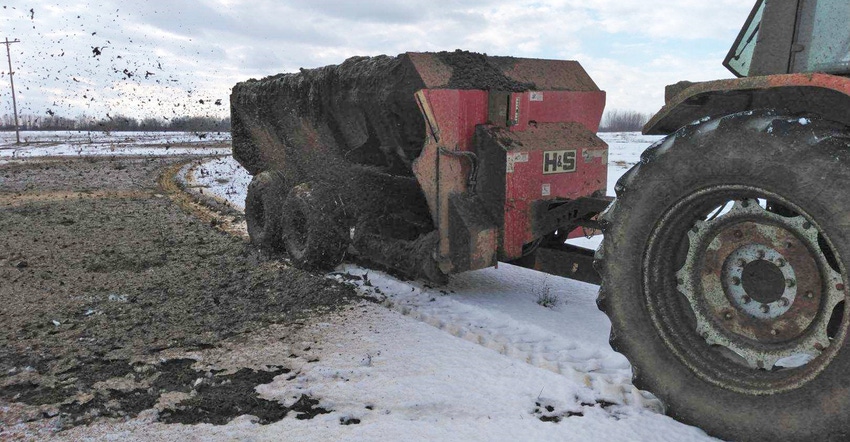
Minnesota lawmakers have introduced a manure bill that addresses the concerns of livestock and poultry farmers pertaining to the updates done to the National Pollutant Discharge Elimination System (NPDES) general permit for animal feedlots.
Revisions in the NPDES permit, renewed by the Minnesota Pollution Control Agency (MPCA) every five years, went into effect Feb. 1. Permit language details when manure can be applied according to the calendar, and when cover crops must be seeded. In 2022, solid manure application in winter will be prohibited.
Around 1,200 Minnesota operations operate with a NPDES permit.
State Sen. Bill Weber and SF 566 co-sponsors, state Sens. Bill Ingebrigtsen and Rich Draheim, introduced this legislation, which is known as the Manure Bill. The state Senate Agriculture Finance and Policy Committee, chaired by Weber, heard testimony on the bill Feb. 22, approved it and sent it to the Senate Environment and Natural Resources Policy and Legacy Finance Committee for further action.
The Manure Bill repeals permit restrictions on spreading manure and prohibiting future restrictions. Specifically, the proposed bill states that no feedlot permit should impose requirements related to pastures owned or used by the feedlot operator, other than restrictions under a manure management plan; prohibit application of solid manure during February and March; require the establishment of cover crops as a condition of allowing manure application in September; and require nitrogen best management practices as a condition of manure application in October.
‘Logistical nightmare’
Weber said during the committee meeting that the feedlot permit does not take into account the weather and the impact it has on field conditions. Several who testified at the meeting noted the same concern, such as Lucas Sjostrom, executive director of the Minnesota Milk Producers Association.
“In the Red River Valley, on average, there are about 12 days in the spring and 20 days in the fall for manure application,” Sjostrom said. “It’s concerning that calendar use of days was used to restrict manure application. We encourage MPCA to describe the conditions [when manure can be land-applied]. We need to consider weather variability across the state.”
Jeff Bauman, with Anez Consulting in Willmar, expressed concern for farmers who want to plant cover crops and now have to adhere to calendar dates that dictate cover crop seeding, tillage practices and manure application.
“It’s a logistical nightmare for farmers,” Bauman said. Ninety percent of his clients depend on custom manure applicators to apply liquid manure. Trying to schedule that service within a limited window with good weather conditions will be tough.
“We cannot go by the calendar,” Bauman said. “We need to go by field conditions.”
MPCA also provided input at the committee meeting. It opposes changes offered in the Manure Bill.
Glenn Skuta, MPCA’s director of the watershed division, which includes the feedlot program, said MPCA relied on data from Discovery Farms in Minnesota and Wisconsin, and that they considered public input when making revisions.
“Discovery Farms data showed melting snow and runoff in February and March,” Skuta said. “Soils are frozen, and that’s why the permit prohibits manure application in March, but it does allow it in February.”
He also noted that permitted livestock and poultry operations generate one-third of the manure in the state.
Read the complete SF 566 Manure Bill.
Read a Feb. 10, 2021, story in The Farmer on the feedlot permit update, New feedlot permits update wintertime manure application.
To learn more about the feedlot program and permitting, visit pca.state.mn.us/feedlots.
About the Author(s)
You May Also Like






